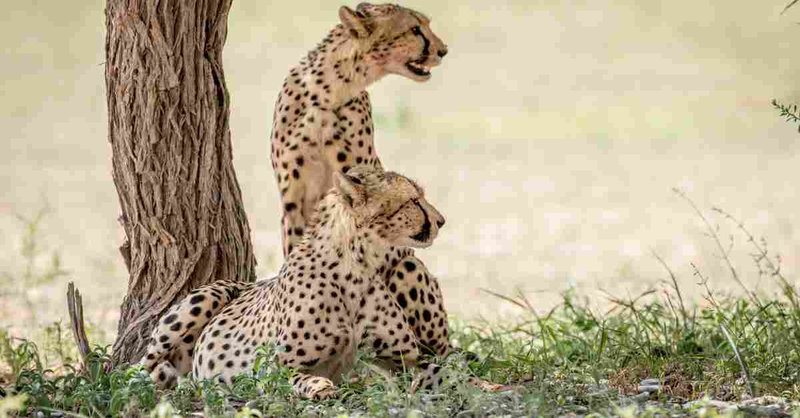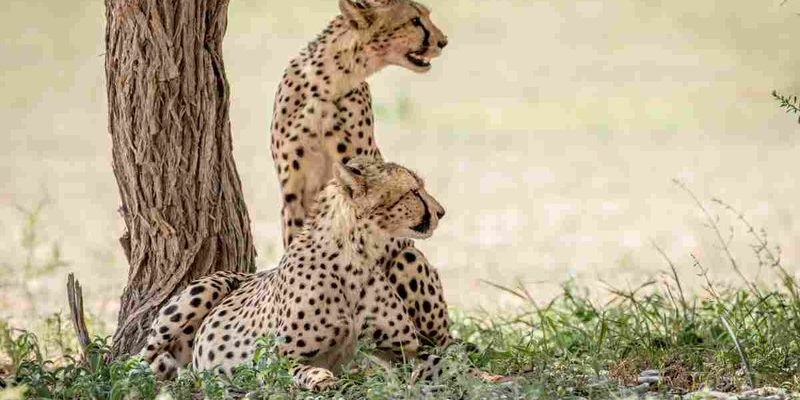
Let’s dive into the fascinating world of cheetah cognition and behavior. Think of it like peeling back layers of an onion—each layer reveals something new and intriguing about how these big cats navigate their environment. I mean, sure, we know they can run fast, but what about their problem-solving skills or adaptability? Let’s explore how smart cheetahs really are!
Cheetahs and the Basics of Intelligence
You might be surprised to learn that animal intelligence isn’t just about how well a creature can solve puzzles or use tools. For cheetahs, intelligence is often reflected in their ability to adapt and thrive in their surroundings. Cheetahs possess a unique combination of instincts, sensory perceptions, and learned behaviors. These aspects work together to make them effective hunters.
Cheetahs rely heavily on their keen eyesight. They have some of the best vision of all big cats, with excellent depth perception and a high ability to detect movement. This strong visual acuity allows them to spot prey from long distances. Here’s the thing: being able to see well isn’t just about finding food; it also plays a role in avoiding dangers. Cheetahs must constantly gauge their environment, which is a testament to their intelligence.
Additionally, cheetahs often demonstrate problem-solving skills when it comes to hunting. They don’t just sprint after their prey without a plan. Instead, they use stealth and strategy, stalking their target to get as close as possible before making a move. This calculated approach shows a clear understanding of their abilities, prey behavior, and the environment around them.
Social Behavior and Communication
Cheetahs are fascinating social creatures, and their behavior reveals a lot about their cognitive skills. Unlike lions, who live in tight-knit prides, cheetahs are generally solitary or form small family groups. Male cheetahs, often referred to as coalitions, will band together for added protection and hunting success.
Communication is another vital aspect of social behavior in cheetahs. They use a range of vocalizations, body language, and even scent marking to communicate with each other. For example, hissing, growling, and purring convey different messages, from warnings to invitations to play. This ability to communicate effectively can be seen as a sign of their cognitive sophistication.
Here’s a fun fact: When cheetah mothers raise their cubs, they teach them essential skills through play. This playful interaction helps the young ones develop their hunting techniques and social interactions, which are crucial for survival. It’s like a lively classroom filled with lessons on life in the wild!
Learning and Memory in Cheetahs
Just like us, cheetahs have the capacity to learn from their experiences. Their memory plays a significant role in how they interact with their environment. For instance, they can remember where they have spotted prey before, allowing them to return to those locations. This ability to recall experiences helps them improve their hunting strategies over time, making them more successful.
Moreover, cheetahs can learn from observing others. Young cheetahs often watch their mothers hunt, learning valuable techniques and tactics they will use later. This observational learning is a hallmark of intelligent behavior. It’s similar to how we might watch a skilled chef to learn new cooking techniques—experience shapes future success.
Additionally, studies suggest that cheetahs can even adapt their hunting methods based on the circumstances they encounter. For example, if a particular prey becomes more challenging to catch, they might alter their approach. This flexibility in behavior is a clear sign of cognitive ability.
Problem-Solving Skills
When you hear “problem-solving,” you might picture a scientist in a lab. Cheetahs, however, show us that problem-solving can be more instinctual and practical. Their intelligence shines through during hunts. They often need to navigate obstacles, like thick brush or rival predators, while pursuing their prey.
For instance, if a gazelle takes a sharp turn, a cheetah must quickly adapt. It’s not just about speed; it’s about being able to think on its feet—literally! This quick thinking allows them to maintain the upper hand and secure their meal. Their ability to process information swiftly and make decisions under pressure shows a level of intelligence that’s not often talked about.
Also, cheetahs can face challenges like finding water or evading threats. They exhibit cleverness in choosing when to hunt or rest based on environmental cues. Understanding when to conserve energy or when to make a sprint is essential for survival, showcasing their smart adaptation to a harsh environment.
The Impact of Human Activity on Cheetah Intelligence
Unfortunately, human activity poses a significant threat to cheetahs and their cognitive abilities. As natural habitats shrink and prey becomes scarce due to development and agriculture, cheetahs face challenges that require even more intelligence to navigate. The survival skills they rely on are increasingly put to the test.
In some areas, cheetahs must adapt to living closer to human populations. This shift can force them to change their hunting techniques or timing, as they learn to avoid people and livestock. It’s as if they’re attending an ongoing class on survival, adjusting their behavior based on the humans they encounter.
Moreover, the pressure from poaching and illegal wildlife trade limits their populations. The loss of genetic diversity can also impact their ability to adapt. Honestly, it’s a tough situation that calls for conservation efforts and awareness to help protect these incredible creatures and the intelligence they carry.
Final Thoughts on Cheetah Cognition
So, how smart is a cheetah? The answer is, quite smart! They showcase a unique blend of problem-solving abilities, social intelligence, and adaptability. From their keen eyesight to their strategic hunting methods, cheetahs demonstrate that intelligence comes in many forms.
As we’ve explored, these big cats exhibit behaviors that reflect their cognitive capabilities, which are crucial for survival in the wild. By understanding more about cheetah intelligence, we can appreciate the intricate ways they navigate their world and highlight the need for their conservation.
In the end, cheetahs remind us that intelligence isn’t just about what you know. It’s often about how you adapt, learn, and communicate with the world around you. Let’s cherish and protect these remarkable animals, ensuring they continue to thrive in their natural habitats for generations to come.

